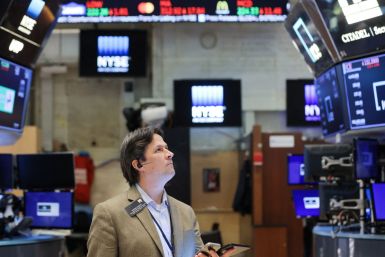President Joe Biden's administration on Friday unveiled tougher fuel economy standards for vehicles reversing his predecessor Donald Trump's rollback of U.S.
Chicago Federal Reserve President Charles Evans on Friday repeated his view that the U.S.
Greece's economy is expected to expand 3.5% this year due to higher energy prices and the Ukraine crisis, the International Monetary Fund said on Friday, lowering a previous 5.4% estimate made last summer.
Australia will sign a trade agreement with India on Saturday that will eliminate tariffs on 85% of Australian goods entering India, helping farmers and miners to diversify export markets, Prime Minister Scott Morrison said.
The benchmark S&P 500 edged higher on Friday as the latest monthly jobs report signaled resilience in the U.S.
The S&P 500 rose modestly to kick off the second quarter on Friday, as the monthly jobs report indicated a strong labor market and is likely to keep the Federal Reserve on track to maintain its hawkish policy stance.
Wall Street was set to open higher on Friday, as U.S.
Haruhiko Kuroda built a career battling a strong yen and the Bank of Japan governor is unlikely to change course in his final year at the helm, eight sources said, despite political pressure to acknowledge that the weak currency is now a problem.
Since the days of Ernest Hemingway's "The Old Man and the Sea", whose main character toiled with oars to catch a marlin, few Cubans have enjoyed the luxury of a motor boat to chase the bounty of fish that lie just offshore of their island home.
As the U.S. stock market ends a rocky first quarter, investors are looking at what could support equities in the coming months - with high cash levels at companies one potential boost as executives deploy resources for share buybacks, dividends or deals.
Fear that the war in Ukraine would tilt the U.S. economy towards a 1970s-style bout of stagflation has given way to signs that Americans plan to keep traveling, returning to restaurants, and continuing a steady if still incomplete return to "normal." .
Two U.S. liquefied natural gas (LNG) projects took major steps toward launching this week as Russia's threats to cut energy supplies to Europe drives up demand and prices for the super-chilled fuel.
With Russia threatening to cut off the supply of vital gas and oil, European governments are dusting off rationing plans that bring back memories of the 1973 energy crisis.
The rouble has staged a lightening-fast recovery to levels last reached in the days before Russia invaded Ukraine, defying predictions that the war would launch it into freefall.
Euro zone inflation surged to 7.5% in March, hitting another record high with months still left before it is set to peak, raising pressure on the European Central Bank to rein in runaway prices even as growth slows sharply.
Gold retreated on Friday and was set to post a weekly decline after robust U.S.
Gold eased on Friday and headed for a weekly decline as a stronger dollar and higher Treasury yields dented the appeal of zero-yield bullion, while investors also awaited a key U.S.
Chinese exports to Russia have been buffeted as the rouble swings in value, clear evidence of a ripple effect that Western sanctions over Russia's invasion of Ukraine are having in China, even as it sticks by its neighbour diplomatically.
European shares rose slightly after early sluggishness on Friday, as a rally in bank stocks helped outweigh worries about economic growth and inflation, with Europe facing a deadline to start paying for Russian gas in roubles.
European shares rose on Friday as a rally in commodity-linked and bank stocks helped outweigh worries about economic growth and inflation, with Europe remaining on alert for a disruption to gas imports from Russia.
Plague, war and inflation define the year so far - but faith in the U.S. dollar seems to have made it through the first three months.
U.S. job growth likely continued at a brisk clip in March, with the unemployment rate falling to a new two-year low of 3.7% and wages re-accelerating, which would position the Federal Reserve to raise interest rates by a hefty 50 basis points in May.
U.S. employers maintained a brisk pace of hiring in March, driving the unemployment rate to a new two-year low of 3.6% while also boosting wages, resulting in a further tightening of labor market conditions and opening the door to a hefty 50 basis points interest rate hike from the Federal Reserve in May.
World stocks dipped further from recent six-week highs on Friday on worries about the Russia-Ukraine war and recession risks, and oil fell $2 a barrel on reserve releases.
Government bond yields resumed their upward climb on Friday on signs of persistent prices pressures, as world shares whipsawed in choppy trade and oil prices braced for a 13% weekly fall following reserve releases.
World shares bounced and government bond yields resumed their upward climb on Friday on signs of persistent prices pressures, while oil was poised for a 13% weekly fall following reserve releases.
Asian shares fell for a second straight session on Friday as worries about the Russia-Ukraine war and risks of recession punctured their rally, while plans to release oil reserves had crude prices heading for a sharp weekly drop.
U.S. stock index futures rose on Friday ahead of U.S.
Asian shares fell on Friday following the biggest quarterly drop in global equities in two years, as investors worried about the impact of the Russian-Ukrainian war and rising risks of recession.
Government bond yields resumed their upward climb on Friday as a key part of the U.S.








































